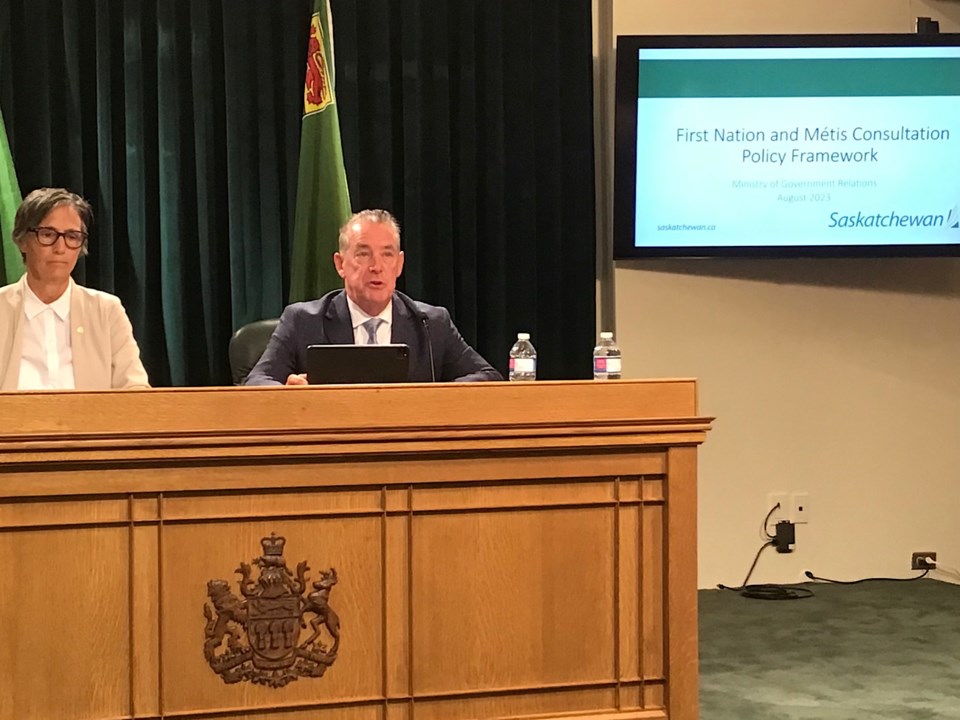REGINA - The government of Saskatchewan has announced its long awaited changes the First Nation and Métis Consultation Policy Framework.
The changes were announced Friday at the legislature. Minister for First Nations, Métis and Northern Affairs Don McMorris called this “an important update regarding the government of Saskatchewan’s commitment to our province’s Duty to Consult with First Nations and Métis communities.”
The province has touted the update as strengthening its commitment to meaningful consultation with First Nation and Métis communities and honouring treaty rights, as well as supporting investment and planning for growth in the resource sector in the province.
Here are key points about the new Consultation Policy Framework, according to the province:
Implementation of the new CPF is slated to happen in 2024
The target is for January 2024 for the revised policy to take effect. For 2023, the plan is for the Ministry of Government Relations to develop the informational and outreach materials for First Nation and Métis communities, industry, government and municipal proponents to support these policy changes.
Crown Land Sale and Lease Paused for two years
Effective immediately, Ministry of Agriculture Crown land auction sales and lease auctions are –°¿∂ ”∆µ paused for two years to allow for implementation of Consultation Policy Framework policy changes.
Statement of Principles
The 2023 policy affirms the province's constitutional obligations respecting Aboriginal and Treaty rights, and affirms the province's commitment to economic reconciliation, and to improve social and economic outcomes for First Nation and Métis people throughout the province.
Enhanced Role for Government Relations
There is an enhanced, centralized coordination and advisory role for the Ministry of Government Relations to support collaboration and overall consistency in the implementation of the policy.
This will include leadership of cross-governmental coordination on complex duty to consult projects, supporting communities and industry in navigating government policy and process, enhanced education and training for government officials, industry and communities, and consolidating the government’s duty to consult processes and records.
A Revised Assessment Chart
The matrix used to determine the level of consultation is –°¿∂ ”∆µ updated to an assessment chart. This is designed to improve clarity and transparency in the process, to increase timelines for both response and consultation activities, and to adjust timelines for the government when reporting back to the community and industry.
According to the province, timelines for government response have been shortened and consultation timelines for communities have been increased to support participation and reduce the need for extensions.
Keeping the policy current
The government has committed to continuously reviewing the CPF and its implementation, to ensure consistency with case law, best practises and feedback from stakeholders and First Nation and Métis communities.
Additional policy updates include clarity on decisions subject to the duty to consult and matters not subject to the duty to consult which reflect current case law, and the role of proponents in the consultation process.
Policy the result of extensive engagement process
The current CPF had been in place since 2010 and the policy has guided the province, First Nations and rights-bearing Metis communities, proponents and other levels of government whenever there is a duty to consult on aboriginal treaty rights and traditional uses of lands and resources.
McMorris said the policy changes have come about because “all parties engaged in the duty to consult process, including First Nation and Métis communities, project proponents, and government ministries have recommended that the policy become more responsive in the current climate of growth and economic reconciliation.”
Their engagement process took place over the summer and fall of 2022. During that process the province held 35 engagement sessions and met with leaders of 22 First Nations, three Tribal Councils, 37 Métis locals, seven Métis Nation - Saskatchewan regional officer, four Indigenous organizations, 39 company and industry associations, and three municipal organizations. They received feedback from 31 percent of First Nations and 38 percent of Métis locals.
“The feedback that we received, from all engagement participants, aligned with our objective to advance reconciliation, drive economic activity for the benefit of all Saskatchewan residents, and foster meaningful and productive relationships between First Nation and Métis communities, government and proponents," said McMorris.




